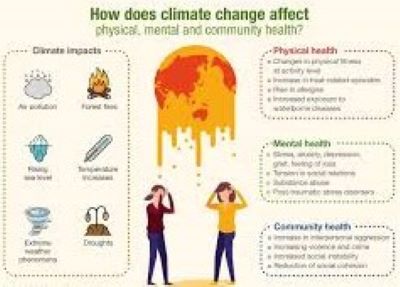The Federal Ministry of Health has released findings from its first Vulnerability and Adaptation Assessment, highlighting severe impact of climate change on the nation’s health sector.
Conducted between January and July 2024 and supported by UK’s Foreign, Commonwealth and Development Office (FCDO), the assessment projected a 21-per-cent increase in disease burden, with northern states facing the highest risk due to extreme climate vulnerabilities.
In an interview with the News Agency of Nigeria (NAN) on Wednesday in Abuja, Godwin Brooks, the Director of Climate Change and Health at the Federal Ministry of Health and Social Welfare, said “climate change is set to heighten health risks across all regions of Nigeria.”
Brooks added that northern states such as Kebbi, Zamfara and Yobe are especially vulnerable, while southern states are also experiencing escalating risks.
He highlighted the potential doubling of heat-related deaths by 2080, with rising temperatures, possibly up to +3°C, expected to worsen conditions for vector-borne diseases.
He explained that increased rainfall is likely to fuel waterborne diseases, with diarrheal deaths in children under 15 projected to contribute to nearly 10 per cent of such fatalities.
He said that coastal areas face greater flooding risks due to rising sea levels, affecting hundreds of thousands of Nigerians.
He added that “this exposure is likely to alter the spread of infectious diseases, impacting health systems across the nation.
“Findings from the Vulnerability and Adaptation Assessment are now forming the foundation of Nigeria’s first Health National Adaptation Plan (HNAP).
“The plan will guide strategies to strengthen healthcare resilience and enhance response capacity for the evolving climate-related health challenges.”
He, therefore, called for swift government action and underscored the importance of community-driven adaptation measures, especially in high-risk regions.
He said that “with increased risks anticipated across the country, Nigeria’s health system must adapt to a ‘new normal,’ where climate change continuously shapes the health landscape.”
NAN reports that according to Ideas.repec.org, climate change poses significant challenges worldwide, with human activities directly and indirectly affecting health.
In Nigeria, the impacts are especially severe due to high vulnerability and limited capacity to adapt.
Research on the health effects of climate change in Nigeria is limited, motivating study to investigate these impacts.
Findings indicate that climate change contributes to increased health risks from rising temperatures, rainfall, sea level rise, and extreme weather.
Key health risks identified include meningitis, respiratory and cardiovascular disorders among the elderly, skin cancer, malaria, high blood pressure and morbidity.
The study urges government to raise awareness of climate-related health risks, particularly among vulnerable groups such as women, children and rural communities.(NAN)


